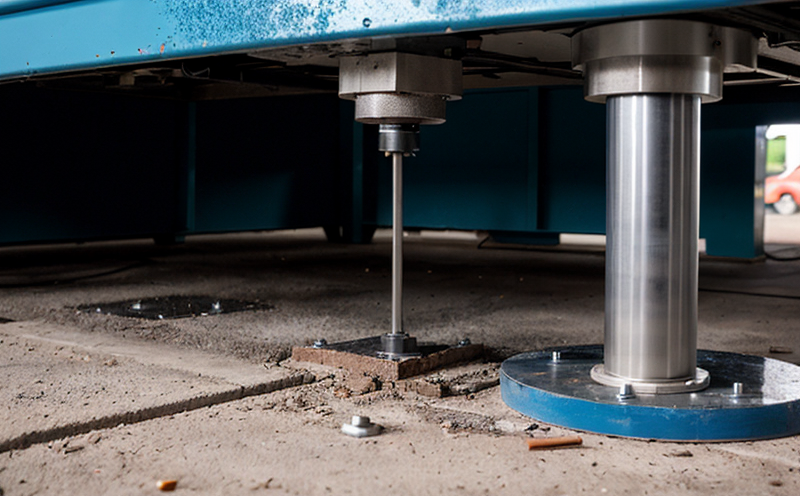ASTM F3302 Residual Stress and Distortion Testing of AM Nickel Alloys
The ASTM F3302 standard is pivotal in ensuring that additively manufactured (AM) nickel alloys, especially those used in critical sectors such as aerospace, medical, and energy, meet stringent quality and performance requirements. This testing method aims to identify and quantify the internal stresses and distortions present within these materials. Understanding residual stress is crucial because it can affect the mechanical properties, fatigue life, and overall reliability of components.
Residual stresses in AM nickel alloys are generated due to the complex thermal and mechanical processes involved in powder bed fusion or directed energy deposition methods. These stresses can cause distortions that lead to dimensional inaccuracies and potential failure under operational conditions. ASTM F3302 provides a standardized approach for evaluating these issues, ensuring consistent results across various testing facilities.
The testing procedure involves several steps: specimen preparation, stress measurement using X-ray diffraction (XRD) or neutron diffraction techniques, and distortion evaluation through dimensional measurements before and after heat treatment. The standard specifies acceptance criteria based on the allowable residual stress levels to ensure compliance with design specifications.
For accurate results, specimens must be carefully prepared according to ASTM F3302 guidelines. This includes ensuring proper orientation relative to the direction of build, avoiding contamination from external sources, and maintaining consistent thermal treatment conditions. The use of advanced instrumentation like synchrotron radiation or commercial XRD systems ensures precise stress measurements.
The significance of this testing cannot be overstated in industries relying heavily on AM nickel alloys for their critical applications. By adhering to ASTM F3302 standards, manufacturers can enhance product quality, reduce rework costs, and ensure regulatory compliance. This is particularly important given the increasing demand for lightweight yet robust components in sectors like aerospace and automotive.
Furthermore, the ability to predict and control residual stresses allows engineers to optimize part designs, leading to improved performance and longer service life of products. Compliance with ASTM F3302 also enhances brand reputation by demonstrating a commitment to excellence in manufacturing processes.
In conclusion, ASTM F3302 provides an essential framework for assessing the quality of additively manufactured nickel alloys through residual stress and distortion testing. Its implementation ensures that these materials meet stringent performance requirements, thereby supporting safer and more reliable end products across various critical industries.
Eurolab Advantages
EuroLab stands out in providing ASTM F3302 residual stress and distortion testing for AM nickel alloys due to our cutting-edge facilities and experienced technical team. Our state-of-the-art laboratories are equipped with high-precision XRD systems capable of detecting even minute levels of residual stress, ensuring accurate results.
- Comprehensive Testing Capabilities: We offer a full range of services tailored specifically for AM nickel alloys, including specimen preparation, testing, and detailed reporting.
- Expertise in Specific Materials: Our technical staff possesses extensive knowledge and experience working with nickel-based superalloys, enabling us to provide highly specialized testing solutions.
- Compliance with International Standards: All our tests are conducted according to the latest versions of ASTM F3302 and other relevant standards, ensuring consistency and reliability in results.
We pride ourselves on delivering accurate, reproducible, and timely reports that meet or exceed customer expectations. Our commitment to quality is reflected not only in our technical expertise but also in our unwavering adherence to the highest industry standards.
Quality and Reliability Assurance
EuroLab places a strong emphasis on quality and reliability assurance throughout all stages of ASTM F3302 testing. Our comprehensive approach begins with meticulous specimen preparation, adhering strictly to ASTM F3302 guidelines to ensure accurate stress measurements.
- Strategic Preparation: Specimens are prepared in accordance with the standard's requirements, ensuring they represent the true nature of the material under test.
- Consistent Thermal Treatment: We employ controlled thermal processes that minimize additional stresses introduced during testing.
The use of advanced instrumentation guarantees precision and repeatability. Our XRD systems are regularly calibrated to maintain accuracy, while our technicians undergo continuous training to stay updated on the latest methodologies.
Our quality assurance measures extend beyond technical proficiency; we also focus on maintaining stringent laboratory protocols. Regular audits and internal reviews ensure compliance with international standards and best practices. This commitment to excellence ensures that every test conducted at EuroLab meets or exceeds customer requirements, fostering trust and confidence in our services.
Environmental and Sustainability Contributions
EuroLab is dedicated to promoting environmental sustainability through its operations, including ASTM F3302 testing. By adhering strictly to the latest versions of international standards such as ASTM F3302, we contribute positively to reducing waste and improving efficiency in manufacturing processes.
- Resource Efficiency: Our advanced instrumentation minimizes material consumption during specimen preparation and stress measurement.
- Emission Control: We implement stringent measures to reduce emissions associated with laboratory operations, including the use of energy-efficient equipment.
Beyond operational practices, EuroLab actively participates in research initiatives aimed at advancing sustainable manufacturing technologies. By leveraging our expertise in ASTM F3302 testing, we support innovations that enhance both product quality and environmental performance.
We believe that sustainability is integral to long-term success. Through continuous improvement and proactive engagement with stakeholders, EuroLab aims to set new benchmarks for environmentally responsible practices within the industry.





